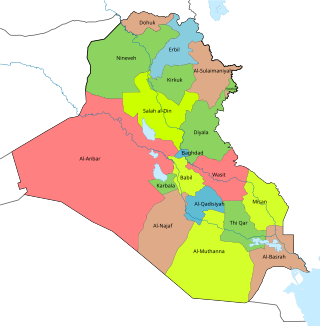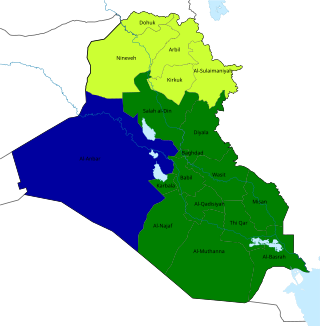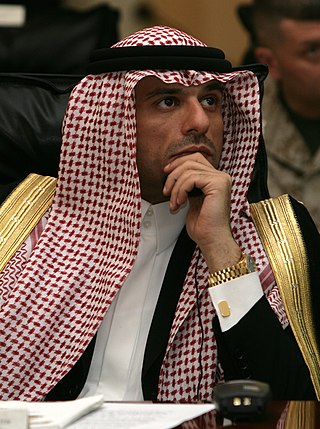Iraq is a federal parliamentary representative democratic republic. It is a multi-party system whereby the executive power is exercised by the Prime Minister of the Council of Ministers as the head of government, the President of Iraq as the head of state, and legislative power is vested in the Council of Representatives.

Iraq consists of 18 recognized governorates, also known as "provinces" and 1 partially recognized governorate (Halabja). Per the Iraqi constitution, governorates can form an autonomous region. Four governorates, Erbil, Sulaymaniyah, Halabja and Duhok, constitute the autonomous Kurdistan Region. Baghdad and Basra are the oldest governorates. The second most-populous one, Ninawa is in the upland region and has a cooler climate of the north-west.

Al Anbar Governorate, or Anbar Province, is the largest governorate in Iraq by area. Encompassing much of the country's western territory, it shares borders with Syria, Jordan, and Saudi Arabia. The population is mostly Sunni Muslims. The provincial capital is Ramadi; other important cities include Fallujah, Al-Qa'im and Haditha.

Parliamentary elections were held in Iraq on 30 January 2005 to elect the new National Assembly, alongside governorate elections and a parliamentary election in Kurdistan Region. The 275-member legislature had been created under the Transitional Law during the international occupation. The newly elected body was given a mandate to write a new constitution and exercise legislative functions until the new constitution came into effect. The elections also led to the formation of the Iraqi Transitional Government.
Under the Iraqi constitution of 1925, Iraq was a constitutional monarchy, with a bicameral legislature consisting of an elected House of Representatives and an appointed Senate. The lower house was elected every four years by manhood suffrage. The first Parliament met in 1925. Ten general elections were held before the overthrow of the monarchy in 1958.

The electorate of Iraq went to the polls on 15 October 2005 to vote in a referendum on whether or not to ratify the proposed constitution of Iraq. After 10 days of counting votes, the country's electoral commission announced that the constitution had been approved by a wide margin nationwide. A number of mainly Sunni critics like future deputy prime minister Saleh al-Mutlaq alleged massive irregularities, saying that soldiers broke in to polling stations and changed votes to yes in the crucial province of Nineveh, which was expected by them to provide the third "no" vote.

The Battle of Al-Qa'im was a military offensive conducted by the United States Marine Corps, against insurgent positions in Iraq's northwestern Anbar province, which ran from 8 May 2005 to 19 May 2005. It was focused on eliminating insurgents and foreign fighters in a region known as a smuggling route and a sanctuary for foreign fighters.

Sheik Ahmed Bezaa Abu Risha is a Sunni leader in the Al-Anbar province, and led the movement of Sunni tribesmen known as the Anbar Salvation Council.

Governorate or provincial elections were held in Iraq on 31 January 2009, to replace the local councils in fourteen of the eighteen governorates of Iraq that were elected in the 2005 Iraqi governorate elections. 14,431 candidates, including 3,912 women, contested 440 seats. The candidates came from over 400 parties, 75% of which were newly formed.

Parliamentary elections were held in Iraq on 7 March 2010. The elections decided the 325 members of the Council of Representatives who would elect the prime minister and president. The elections resulted in a partial victory for the Iraqi National Movement, led by former Interim Prime Minister Ayad Allawi, which won 91 seats, making it the largest alliance in the Council. The State of Law Coalition, led by incumbent Prime Minister Nouri Al-Maliki, was the second largest grouping with 89 seats.

The Anbar campaign consisted of fighting between the United States military, together with Iraqi security forces, and Sunni insurgents in the western Iraqi governorate of Al Anbar. The Iraq War lasted from 2003 to 2011, but the majority of the fighting and counterinsurgency campaign in Anbar took place between April 2004 and September 2007. Although the fighting initially featured heavy urban warfare primarily between insurgents and U.S. Marines, insurgents in later years focused on ambushing the American and Iraqi security forces with improvised explosive devices (IEDs), large scale attacks on combat outposts, and car bombings. Almost 9,000 Iraqis and 1,335 Americans were killed in the campaign, many in the Euphrates River Valley and the Sunni Triangle around the cities of Fallujah and Ramadi.
The Al Anbar Governorate election of 2009 was held on 31 January 2009 alongside elections for all other governorates outside Iraqi Kurdistan and Kirkuk.

Operation Sayeed also known as Operation Hunter in English, was a series of operations conducted in western Al Anbar Governorate by the United States Marine Corps in 2005. It was an umbrella operation, consisting of at least 11 named operations between July 2005 to December 2005. The purpose was to drive Al-Qaeda in Iraq forces from the Western Euphrates River Valley. Some parts of Operation Sayeed were Operation Steel Curtain and Operation Iron Fist.

Governorate or provincial elections were held in Iraq on 20 April 2013, to replace the local councils in the governorates of Iraq that were elected in the Iraqi governorate elections of 2009. Elections took place in 12 of Iraq's 18 governorates. Elections didn't take place in the 3 governorates forming the Kurdistan Region or Kirkuk, Anbar, or Nineveh, meaning that a total of 378 provincial council seats were up for election.

Operation al-Shabah was launched in May 2013 by the Iraqi Army, with the stated aim of severing contact between the Islamic State of Iraq and the Levant and the al-Nusra Front in Syria by clearing militants from the border area with Syria and Jordan.
The Al Anbar governorate election of 2013 was held on 20 June 2013 alongside elections for Nineveh.

The 2013 Nineveh Governorate election in Iraq was held on 20 June with elections for the Al Anbar Governorate. Due to security problems, turnout was less than half that of the 2009 election. This election saw Sunni Arab parties lose a number of seats to minority parties.

Ali Hatem Abd al-Razzaq Ali al-Suleiman al-Assafi al-Dulaimi is an Iraqi Sunni tribal leader (sheikh). He is the sheikh of the Dulaim tribe, in Al Anbar Governorate.

The departure of US troops from Iraq in 2011 ended the period of occupation that had begun with the U.S.-led invasion in March 2003. The time since U.S. withdrawal has been marked by a renewed Iraqi insurgency and by a spillover of the Syrian civil war into Iraq. By 2013, the insurgency escalated into a renewed war, the central government of Iraq being opposed by ISIL and various factions, primarily radical Sunni forces during the early phase of the conflict. The war ended in 2017 with an Iraqi government and allied victory, however ISIL continues a low-intensity insurgency in remote parts of the country.

Governorate or provincial elections were scheduled to be held in Iraq on 20 April 2020, to replace the provincial councils in the governorates of Iraq that were elected in the 2013 Iraqi governorate elections and, in Kurdistan Region, in the 2014 elections. The elections were delayed indefinitely in November 2019, amidst demonstrations demanding the end of the existing political system.














